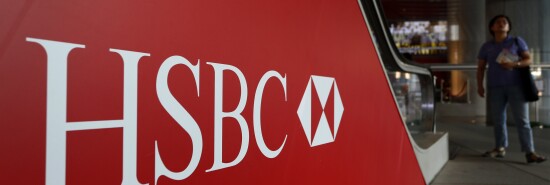
Congress should summon HSBC executives over support for Hong Kong repression
Tom Rogan
Video Embed
The House Select Committee on the Chinese Communist Party should ask HSBC executives to testify over their support for China‘s repression in Hong Kong.
The committee should invite and, if necessary, subpoena testimony from HSBC legal chief Bob Hoyt and the bank’s U.S. and Americas division CEO Michael Roberts. It should ask these executives why they are contravening HSBC’s human rights policy by freezing accounts belonging to human rights activists.
WHY CHINA’S DANGEROUS SECOND THOMAS SHOAL ESCALATION MATTERS
HSBC’s great deference to Beijing’s oppression has long been clear. It cares about its retained access to the lucrative Hong Kong banking market and not much else. Still, the bank wants it so that only Beijing recognizes its deference, not the rest of the world. Being a party to endemic human rights abuses, after all, isn’t a great look for a major multinational bank.
Underlining as much earlier this week, the bank’s public relations chief, Sherard Cowper-Coles, issued an utterly disingenuous apology over his comments that the U.K. was “weak” to follow certain U.S. restrictions on trade with China. HSBC’s distancing of itself from Cowper-Coles’s remarks was equally disingenuous. Both Cowper-Coles and his employer know that his rhetoric will earn them new favor with Xi Jinping’s regime.
HSBC should not, however, find easy favor with the governments of the free world.
As the Hong Kong Democratic Committee noted on Tuesday, 28 Hong Kong resident relatives of democracy activists living abroad have been questioned or arrested in recent weeks. This is a well-worn Chinese Communist Party strategy employed to pressure activists abroad to return home for persecution or face the escalating persecution of their family members. China has also threatened to hunt down activists in the West, a seeming play to Russia’s assassination campaign against defector spies.
HSBC is supporting these efforts.
Take the bank’s treatment of activist Anna Kwok. On Wednesday, the Hong Kong Democratic Committee noted how Kwok’s parents were interrogated in Hong Kong on Tuesday. It continued, “At 26, [Kwok is] dealing with an absurd bounty of [$128,000] on her head, her assets in Hong Kong frozen by HSBC without explanation, and now her parents interrogated and intimidated — all because she dares to fight for promised freedoms in Hong Kong.”
This is accurate. Kwok’s only crime is to advocate rights that Beijing itself is obliged to provide to her and all Hong Kong’s residents. Under the legally binding Sino-British Joint Declaration treaty, Beijing committed to retain Hong Kong’s democratic character and rule of law until at least 2047. It is now shredding that obligation.
HSBC doesn’t care. In a quite stunning show of appeasement, the bank actually expressed support for the national security law that Beijing is now using to strangle Hong Kong’s freedom. And the bank has been freezing the accounts of activists like Kwok for years now. It has gotten away with this because the U.K. government doesn’t want to endanger its fragile, post-Brexit economic relationship with China or the international banking industry.
Fortunately, the China select committee led by Rep. Mike Gallagher (R-WI) should have no such conflicts of interest. The committee should thus ask HSBC executives how their Hong Kong policies correlate with the bank’s published human rights policy. HSBC’s human rights policy says, “We are guided by the International Bill of Human Rights, including the UN Declaration of Human Rights. … We are signatory to, or have expressed support for, the UN Global Compact, the OECD Guidelines for Multinational Enterprises, the Global Sullivan Principles.”
Really?
The committee should ask how HSBC’s treatment of activists like Kwok comports with the U.N. Universal Declaration of Human Rights’s Article 19: “Everyone has the right to freedom of opinion and expression; this right includes freedom to hold opinions without interference and to seek, receive and impart information and ideas through any media and regardless of frontiers.”
CLICK HERE TO READ MORE FROM THE WASHINGTON EXAMINER
The committee should ask how HSBC’s policies in Hong Kong comport with the U.N. Global Compact’s first two principles. The first being, “Businesses should support and respect the protection of internationally proclaimed human rights.” And the second being, “make sure that they are not complicit in human rights abuses.”
The committee should ask how HSBC’s policy comports with the Global Sullivan Principles commitment to “Work with government and communities in which we do business to improve the quality of life in those communities – their educational, cultural, economic and social well-being….”
HSBC won’t be able to answer these questions, of course. But that doesn’t mean it shouldn’t be put on the spot. If nothing else, the world should know that this bank is a rather hesitant servant of individual freedom.
